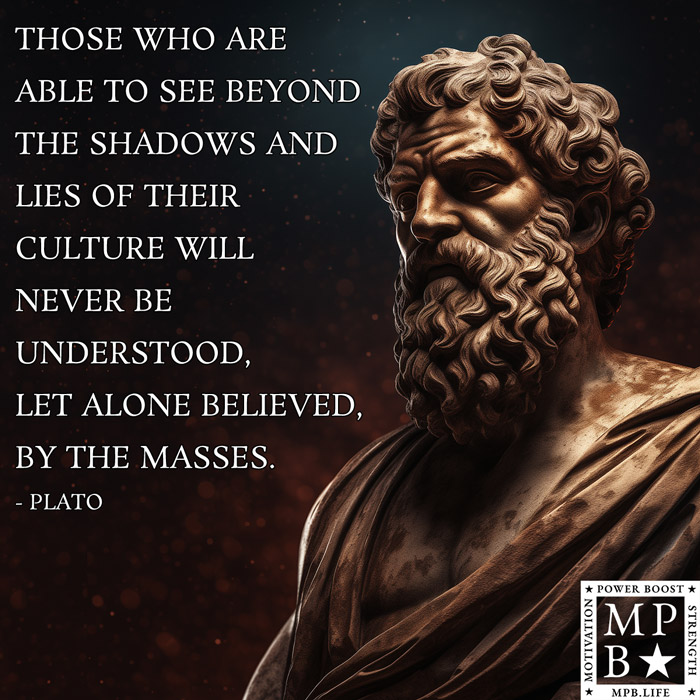
Those Who Are Able To See Beyond Graphic © motivationpowerboost.com
Those who are able to see
beyond the shadows and lies of their culture will never be understood, let alone believed, by the masses.
-Plato
Challenging Cultural Norms: A Path to Enlightenment
Plato’s profound statement sheds light on the inherent difficulty of questioning deep-seated cultural beliefs and norms. Individuals who possess the ability to transcend the prevailing narratives and deceptions ingrained within their society often find themselves at odds with the general populace.
Throughout history, numerous visionaries and thought leaders have faced immense resistance and skepticism when attempting to introduce novel ideas or challenge widely accepted conventions. Their perspectives, which diverge from the established dogmas, are frequently met with incredulity and outright rejection by the masses.
This phenomenon can be attributed to several factors. Firstly, cultural conditioning plays a significant role in shaping our worldviews and beliefs from a young age. The dominant narratives instilled by societal institutions, such as education systems, media, and religious organizations, exert a powerful influence on how we perceive reality. Breaking free from these entrenched paradigms requires a substantial amount of critical thinking and intellectual independence.
Additionally, the human tendency to seek comfort in familiarity and conform to social norms can act as a barrier to embracing new perspectives. Challenging long-held beliefs can evoke feelings of uncertainty and discomfort, leading many to cling to the established order, even when presented with compelling evidence or rational arguments.
Moreover, those who wield power and authority within a society often have vested interests in maintaining the status quo. Innovative ideas or alternative worldviews that threaten their positions or undermine their control may face active resistance and suppression.
Despite these challenges, it is imperative for societies to foster an environment that encourages critical thinking, open discourse, and the exploration of new ideas. Progress and enlightenment can only be achieved when individuals are empowered to question existing paradigms and seek deeper truths beyond the surface-level narratives.
Embracing diverse perspectives and engaging in respectful dialogue can lead to a more nuanced understanding of complex issues, fostering intellectual growth and societal advancement. However, this process requires a willingness to engage with ideas that may initially seem foreign or unsettling, as well as a commitment to open-mindedness and intellectual humility.
In essence, Plato’s statement serves as a poignant reminder of the inherent hurdles faced by those who dare to challenge the boundaries of conventional wisdom. It is a call to cultivate a spirit of inquiry, critical thinking, and the courage to venture beyond the shadows of cultural indoctrination in pursuit of deeper truths and enlightenment.
Overcoming the Obstacles to Enlightenment
While the pursuit of enlightenment and the challenging of cultural norms is a noble endeavor, it is essential to acknowledge the practical difficulties that often arise along this path. One of the primary obstacles lies in the deeply ingrained psychological mechanisms that perpetuate the status quo and resist change.
Cognitive biases, such as confirmation bias and the backfire effect, can lead individuals to selectively seek and interpret information in a way that reinforces their existing beliefs, while dismissing or discounting contradictory evidence. This tendency can be particularly pronounced when it comes to long-held cultural norms and worldviews, as they are often intertwined with personal identity and a sense of belonging.
Furthermore, the fear of social ostracism and the desire for acceptance can act as potent deterrents to challenging cultural norms. Individuals who voice dissenting opinions or question established narratives may face ridicule, marginalization, or even outright rejection from their social circles or communities. This fear can be a powerful force that discourages critical thinking and stifles the exploration of alternative perspectives.
To overcome these obstacles, it is crucial to develop a strong sense of intellectual independence and a commitment to objective truth-seeking. Cultivating the ability to critically examine one’s own beliefs and biases, as well as a willingness to engage with opposing viewpoints with an open mind, can help mitigate the impact of cognitive biases and the fear of social rejection.
Additionally, seeking out diverse perspectives and engaging in respectful discourse with individuals from different backgrounds and worldviews can broaden one’s understanding and expose blind spots in one’s own thinking. This exposure to alternative narratives can help challenge the assumptions and beliefs that are deeply rooted in cultural conditioning.
Ultimately, the path to enlightenment and the challenging of cultural norms requires perseverance, courage, and a genuine commitment to personal growth and the pursuit of truth. It is a journey that demands a constant willingness to question assumptions, confront uncomfortable truths, and embrace the discomfort that often accompanies the expansion of one’s intellectual horizons.
Related Inspirational Quotes
“It is no measure of health to be well adjusted to a profoundly sick society.” -Jiddu Krishnamurti
“The oppressed are allowed once every few years to decide which particular representatives of the oppressing class are to represent and repress them.” -Karl Marx
“The philosophers have only interpreted the world, in various ways; the point is to change it.” -Karl Marx
“It is lamentable, that to be a good patriot one must become the enemy of the rest of menkind.” -Voltaire
“To be free in an age of bondage is to be a revolutionary.” -Khalil Gibran
